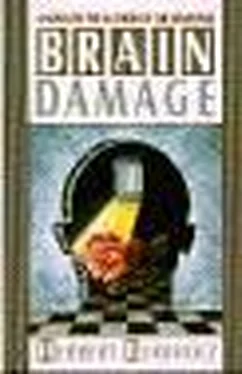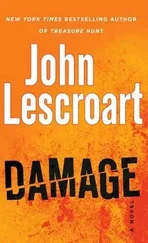The trouble was, it was too simple. If he played it that way, Jessup would have to tell both Weiss and Simms why they were being protected. He would have to tell both of the coaches, and he would have to tell the people in Florida. Equally distasteful, he would have to bring in squads of Agency people, each of whom would have to know at least a piece of the picture. Cover stories could be concocted, good stories prepared by master deceivers, but the Agency lived in a goldfish bowl these days, and there was always the risk that the cover would fail.
It was a risk that Jessup was unwilling to take, and just the thought of it had frozen his guts with fear. When he and Delaney spoke to us about averting a tragedy, they weren't talking about murder, or arson, or rape. They were talking about public relations and image building. To them, the real tragedy would be if the word got out that the DDO, before he died, had ordered up a series of horrors on a mad caprice. In their worst-case scenario they could see it all laid out on the eleven o'clock news. That, to them, meant true tragedy.
So they were handing it over to us, and that in itself showed how little they knew about sensitives. Either, like Jessup, they thought of us as tricksters, or they jumped to the other extreme by investing us with powers that existed only in their imaginations. If you were to listen to some of the stories that they told around the water coolers up at Langley they'd have you believing that an ace could read minds in the Kremlin from a thousand miles away, lift a two-ton truck by sheer willpower, and think himself from Kansas City to San Diego in the blink of an eye. It was all nonsense, born out of ignorance. A sensitive, because of his neurological imbalance, is highly receptive to the thoughts and emotions of others. He can hear those thoughts as if they were spoken. That is all he can do, and he can do it at a range of two hundred feet at the most. All the rest of the talk is wishful thinking. Delaney knew that, but Jessup didn't. Jessup had started out thinking of us as tricksters, and now, in his desperation, he had decided that we were demigods, and the answer to his prayers. It would have done us no good at all to tell him that we were neither.
"Mr. Jessup," said Sammy, "it looks to me like you've got yourself one hell of a problem."
"Yes, I do," said Jessup. "And now you have it, too."
THE place that The Prisoner thought of as his prison was, in fact, I an armed encampment in the Libyan Fezzan. Beyond the camp, to the north, were seas of dusty gravel and long drifts of sand that rose up into the volcanic massif of the Jebel Soda. To the south, past the oasis palms, were dunes that ran in graceful arcs of beige, and gold, and bisque down to the arid slice of the Wadi Tengesir that cut across the plain. Despite the palms, and the kaleidoscope of shifting sands, it was an altogether desolate place.
The encampment was circled by three tiers of barbed-wire fencing and a field of mines. Surface-to-air missiles poked their snouts at the skies, and a regiment of tanks was based nearby. The perimeter of the camp was guarded by a crack unit of the Libyan Army, and supplies were trucked in from Sokna to the north. All of this effort was exerted for the safety and convenience of the twenty-three men who actually occupied the camp, but the effort was wholly external. There was no staff within the camp to service the men. The occupants cooked their own food, policed their own grounds and latrines, conducted their own training, and held their own formations. Only their spiritual leadership came from the outside in the person of an imam who visited the camp once each week. Their temporal well-being was the responsibility of
The Prisoner, and even he was subject to the orders of a committee that sat far away in Beirut.
The Prisoner thought of himself as such because he was forbidden to leave the camp without the permission of the committee, and that permission had been denied for the past eleven months. He had been operational for seven years before that, involved in the hijacking of three aircraft, the bombing of a railroad station in Rome, the abduction of two members of the royal family in Saudi Arabia, and a string of other ventures which, although successful, had, in the end, cost him his anonymity. His face and his name now were known to the world. True, it was not the face and the name with which he had been born; plastic surgeons and export forgers had taken care of that, but enough about him was now known to convince the committee that, if not forever, at least for the foreseeable future he should be taken off field operations. He was too valuable to put at risk in the outside world, and so for the past eleven months the camp in the Fezzan had been his home and his prison. From there he had sent men out on missions that should have been his. Some of the missions had succeeded, some had failed, but none had borne his personal stamp. For eleven months he had stormed and fretted in his prison although, in fact, there was nothing to prevent him from leaving save the unenforceable directive from the faraway committee. He could, at any time during those months, have ordered up a vehicle and driven through the gates of the camp into the outside world. That he had not done so, had never even thought of doing so, was a tribute both to his sense of discipline and to his reluctant agreement that the decision of the committee had been proper.
Still, he stormed and fretted in his self-made prison, his life made bearable by his faith, his love of music, and the weekly visits from the imam. He prayed at dawn, at noon, at midaftenoon, at dusk, and after dark; and those prayers were bright beads on the strings of his day. The rest of his time was a routine grind: calisthenics, small arms drill, obstacle course, endurance runs, political orientation; all of this punctuated by indifferent meals. In the late afternoon the men played soccer on a section of packed-down plain, and after that there was a private hour that each man held for his own. The other men spent that hour on their cots in the sleeping tent, but The Prisoner spent his in a smaller tent that served the camp both as a squad room and as a tekiyeh , a place of religious gathering. The Prisoner did not go there for religious purposes. On the contrary, it was during that hour that he displayed what his men considered to be his only weakness, a love of western music, grand opera in particular. There was a phonograph in the squad room and a stack of old records that belonged to The Prisoner, and each day at that hour he lay there on a pallet, his eyes closed and his being as one with the music of Verdi and Puccini, Wagner and Strauss that rolled out over the sands.
The Prisoner looked forward to the weekly visit by the imam as much for the single letter that he never failed to bring as for the religious guidance that he provided. The Prisoner was the only man in the camp to receive mail, for these were Holy Warriors cut off from the world. A grudging exception was made for The Prisoner. His reputation and his seniority allowed him to demand the privilege, and it was, after all, only a single envelope that was carefully examined and its contents read before being forwarded on. Always from the same source, and written in the same hand, the letter came to The Prisoner by a circuitous route, being mailed first to a blind address in Paris, forwarded from there to the Libyan embassy on the Via Nomantana in Rome, and sent from there by diplomatic bag to Tripoli. On those days when the imam brought the letter, The Prisoner would retire with it to the squad room, read it once, then again, and spend the rest of his private hour in apparent meditation. On those days he did not play music.
The imam who visited the camp was a man of true holiness, but he was also a practical man who knew when to close an eye. He was aware of the women who were brought to the camp every month, but he chose to ignore them, just as he chose to ignore the western music that The Prisoner played on his phonograph. The main concern of the imam was to keep his Holy Warriors finely tuned, and much of his time was spent in trying to convince The Prisoner that his enforced idleness was a form of positive action.
Читать дальше












